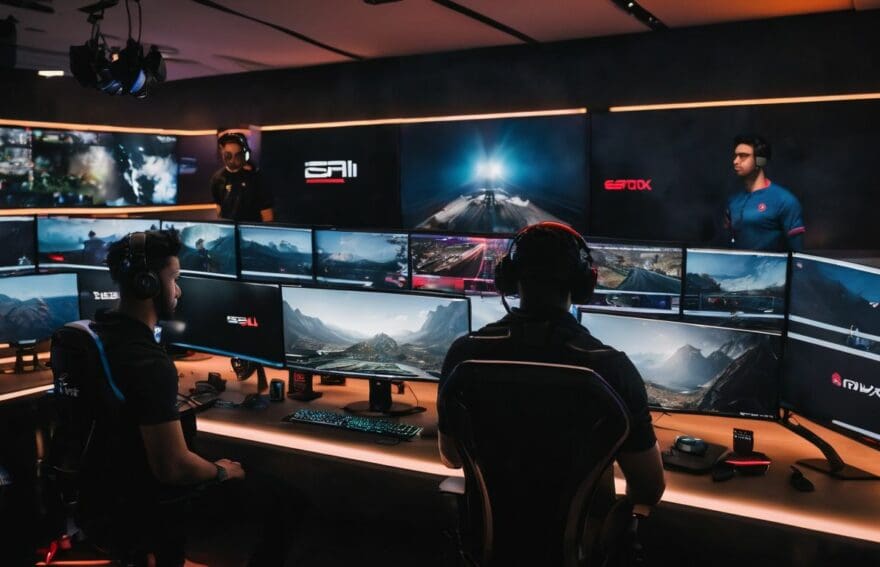The Psychology of Team Success in Esports

Updated On: November 03, 2025 by James Connolly
We’ve all felt the palpable tension of a nail-biting match, where camaraderie and collective effort can tip the balance between glory and near miss. As seasoned enthusiasts and active players in the vibrant world of esports, we understand that triumph isn’t just a product of individual prowess; it’s the spirit of unity within a team that truly elevates performance.
Drawing on fresh insights from cutting-edge research into electronic sports psychology, our feature explores techniques that seamlessly blend innate ability with exceptional synergy to achieve peak performance in esports.
Prepare yourselves – it’s time to take your team’s play to remarkable new heights!
What is Esports and Why is it So Appealing to Fans?
Esports, short for electronic sports, is a form of competition using video games. It’s so appealing to fans due to its competitive nature, accessibility, and high entertainment value that draws in both players and spectators.
Competitive nature
In the high-stakes world of esports, we thrive on competition. Our teams go head to head in intense battles where split-second decisions and flawless execution are the difference between victory and defeat.
They practice for hours, honing skills that push their strategic thinking to its limits, knowing that every game is a mental marathon just as much as it is a showcase of technical prowess.
We confront challenges together, employing psychology techniques like mental toughness training to boost resilience during nail-biting tournaments. Team success hinges not only on individual skill but also on our ability to coordinate seamlessly under pressure.
As competitors, our goal transcends merely playing the game; we strive to master it both mentally and strategically, channeling our competitive nature into formidable synergy that leads us down the path of champions.
Accessibility
Esports offers an unprecedented level of accessibility, allowing players to compete on a global scale from the comfort of their own homes. With the rise of online gaming platforms and digital communities, gamers can easily connect with others around the world, breaking down geographical barriers.
This level playing field enables novice gamers to learn from experienced players, access tutorials, and participate in competitive events without significant financial investment or travel requirements.
Additionally, the widespread availability of esports titles on various gaming devices makes it easier for passionate gamers to engage with their favorite games anytime and anywhere.
Ultimately, this enhanced accessibility fosters a diverse and inclusive environment within the esports community, opening doors for individuals regardless of their background or location.
Entertainment value
Esports offers a high entertainment value to fans and players alike. The fast-paced action, intense competition, and strategic gameplay provide an electrifying experience for spectators.
From jaw-dropping plays to nail-biting finishes, esports events deliver a thrilling spectacle that captivates audiences worldwide. The immersive nature of esports tournaments, coupled with the engaging narratives woven into each match, creates an unparalleled form of entertainment that keeps fans on the edge of their seats.
The thrill of witnessing top-tier players showcasing their skills in real-time adds to the allure of esports. With teams constantly vying for victory and delivering astonishing displays of talent, the entertainment factor is undeniable.
The Importance of Team Dynamics in Esports
Team dynamics are crucial in esports, with effective communication and trust being key components. It’s essential for teams to have strong chemistry to work together seamlessly during high-pressure matches.
Communication
Effective communication is vital for esports teams to succeed. Clear and concise communication among team members allows for quick strategy adjustments, enhances coordination during gameplay, and fosters a supportive environment.
Teammates should actively share information about opponents’ movements, game objectives, and their own actions to ensure seamless teamwork and capitalise on each other’s strengths.
Esports psychology emphasises the importance of open lines of communication to build trust within the team and maintain a positive atmosphere for optimal performance.
Teams that prioritise effective communication can develop a stronger sense of unity and cohesion, leading to improved overall performance on the virtual battlefield. Additionally, in high-stakes tournaments where split-second decisions can make all the difference between victory and defeat, clear verbal cues or non-verbal signals can be critical in propelling the team towards success.
Trust
Establishing trust among team members is crucial for the success of any esports team. Trust forms the foundation for effective communication and collaboration, enabling players to rely on each other’s abilities during intense gaming moments.
Research has shown that high levels of trust within a team lead to improved performance, as it fosters an environment where players feel comfortable taking risks and working together towards common goals.
In esports, trust also plays a vital role in decision-making processes, allowing teams to make quick and decisive choices under pressure.
Esports psychology covers mental skills, confidence, stress management, and performance psychology. Successful esports teams rely on teamwork, communication, and leadership for their performance.
Team chemistry
Team chemistry is the backbone of successful esports teams, and it encompasses the crucial elements of communication, trust, and camaraderie. Effective communication among team members ensures coordinated strategies and seamless gameplay execution.
Without a strong bond built on trust, players may struggle to rely on each other during intense moments in the game. Moreover, fostering an atmosphere of mutual respect and understanding contributes to a positive team dynamic that can significantly enhance overall performance.
Establishing solid team chemistry within an esports team not only promotes unity but also creates an environment where players feel supported and valued. This cohesion allows for better synchronisation during gameplay, enhancing decision-making processes and strategic adaptability.
Key Factors in Mental Performance for Esports Teams
Processing speed, focus, and emotional regulation are crucial mental factors that can determine the success of an esports team – find out more about the psychology behind team success in our upcoming blog post!
Processing speed
Processing speed is a crucial mental aspect for esports teams, directly impacting their in-game performance. The ability to quickly interpret and respond to visual cues, make split-second decisions, and execute actions with precision is essential for success in fast-paced games.
Teams with faster processing speeds can gain a competitive edge, allowing them to outmanoeuvre opponents and seize strategic opportunities during gameplay.
Mastering processing speed involves developing cognitive skills through intensive training and practice. This not only enhances individual player performance but also contributes to the overall effectiveness of the team.
Focus
To excel in esports, maintaining a high level of focus is crucial. Players need to remain attentive and sharp throughout the game, especially during intense and fast-paced moments.
This requires honing cognitive skills and mastering emotional regulation to stay focused under pressure. By enhancing mental toughness through sports psychology techniques, players can improve their ability to concentrate on the game while managing stress effectively.
Additionally, developing strong processing speed is essential for making split-second decisions and reacting swiftly to changing game dynamics.
Emotions
Emotions play a crucial role in the mental performance of esports teams. Managing emotions effectively can impact decision-making, reaction times, and overall gameplay. Confidence and stress management are essential components of esports psychology, helping players navigate the intense competitive environment with resilience.
Understanding and regulating emotional responses contribute to maintaining peak performance during high-stakes tournaments.
Esports psychology techniques focus on mental skills such as confidence-building, stress management, and performance psychology. Mastering emotional regulation equips players with the resilience needed for success in high-pressure gaming scenarios.
Strategies to Improve Team Unity and Success
– Team-building exercises can help improve trust and communication among team members, leading to better teamwork and ultimately, success in esports competitions. Regular team meetings also provide an opportunity for players to discuss strategies and address any issues that may be hindering their performance.
Team-building exercises
Team-building exercises are instrumental in fostering a strong bond among esports team members, enhancing their cohesion and collaboration. Engaging in activities that require teamwork, problem-solving, and communication can significantly improve the trust and camaraderie within the team.
These exercises not only promote a sense of togetherness but also help in identifying each member’s strengths and weaknesses, allowing for better division of responsibilities based on individual abilities.
Furthermore, such activities contribute to building resilience and adaptability within the team as they face varying challenges during gameplay. By incorporating team-building exercises into regular practice sessions, esports teams can cultivate a supportive and encouraging environment that is conducive to sustained success.
Regular team meetings
Regular team meetings are crucial for enhancing communication, fostering trust, and strengthening teamwork within esports teams. By coming together regularly, players can discuss strategies, address concerns, and provide constructive feedback to improve their performance.
These meetings also create an opportunity for team members to build camaraderie and rapport, contributing to a cohesive and unified team dynamic essential for success in competitive gaming.
Emphasising regular team meetings is not just about discussing game tactics; it also provides an avenue for players to express emotions, manage stress, and strengthen mental resilience.
Additionally, these gatherings allow for the allocation of clear roles and responsibilities among team members while providing a platform for brainstorming ideas that lead to innovative gameplay techniques.
Clear roles and responsibilities
To ensure smooth teamwork, regular team meetings lay the foundation for effective communication and trust. Now, let’s delve into the importance of clear roles and responsibilities within an esports team.
Every member must understand their specific duties to achieve coordinated gameplay and optimal performance on the virtual battlefield. The success of an esports team heavily relies on each individual’s ability to fulfill their assigned tasks while supporting their teammates in achieving overall objectives.
This clarity provides a sense of purpose and direction, fostering unity and synergy among team members as they work towards common goals.
Effective coordination within an esports team not only enhances performance but also promotes a healthy gaming environment where each player feels valued and contributes meaningfully to the collective effort.
The Impact of Esports on Health and the Need for Moderation
Esports can have both physical and mental health impacts on players, so it’s important to find a balance and practise moderation. Prioritising wellbeing can lead to better performance in the long run.
Physical and mental health
Maintaining physical and mental health is crucial for esports players to sustain peak performance and overall wellbeing. Frequent screen time can lead to eye strain, headaches, and disrupted sleep patterns.
It’s essential for gamers to take regular breaks, practice good posture, and engage in physical activity to counteract the sedentary nature of gaming. Additionally, managing stress levels through relaxation techniques and cultivating a balanced lifestyle can enhance mental resilience and cognitive function, contributing to better gameplay.
Esports psychology covers various mental skills such as confidence-building, stress management, and performance psychology that are essential for sustaining a healthy mindset during intense competitions.
Importance of balance
Balancing physical and mental health is crucial for esports players. Our bodies and minds need to be well-maintained to perform at the highest level, ensuring that we can focus on our gameplay without being hindered by fatigue or stress.
It’s important to strike a harmony between spending time in front of a screen and engaging in physical activities to avoid negative health impacts associated with prolonged gaming sessions, such as eyestrain and sedentary behaviour.
Moreover, maintaining a healthy balance between gaming and other aspects of life promotes overall well-being, preventing burnout and enhancing long-term performance.
In addition to managing physical health, it’s equally essential for gamers to prioritise their mental well-being. Seeking balance by incorporating relaxation techniques, social interaction, and pursuing hobbies outside of the gaming world helps alleviate stress, recharge cognitive abilities, improve concentration during gameplay sessions while also fostering personal growth.
Conclusion
The psychology of team success in esports is crucial for achieving peak performance. Understanding the mental aspects, such as teamwork dynamics and communication strategies, can significantly impact a team’s cohesion and overall success.
By focusing on mental toughness training and implementing effective teamwork techniques, esports teams can enhance their performance and create a competitive edge in the gaming world.
As the demand for esports psychologists grows, it’s clear that recognising and harnessing the psychological factors behind team success is essential for continued advancement in this rapidly evolving industry.
FAQs
1. What makes a successful esports team?
Successful esports teams thrive due to strong teamwork, effective communication, solid team composition, and psychological resilience among players.
2. How important is mental performance in esports?
Mental performance is crucial; it involves cognitive psychology for strategic thinking, motivation for continual improvement, and emotional regulation during high-pressure moments.
3. Does the way an esports team communicate affect their success?
Absolutely! Team communication is fundamental in gaming as it ensures coordination and helps maintain team cohesion throughout tournaments.
4. Can the wellbeing of esports players impact their gameplay?
Yes indeed, looking after the wellbeing of esports players can enhance their overall performance by preventing burnout and fostering a supportive environment that promotes psychological resilience.
5. In what ways do psychological factors contribute to competitive gaming?
Psychological factors such as confidence, focus, stress management techniques, and mutual support all play significant roles in ensuring consistent peak performances within competitive gaming scenarios.
6. Why is understanding team dynamics essential for building a winning Esports squad?
Understanding team dynamics aids in forming balanced teams with complementary skills and personalities which fosters better collaboration needed to confidently transition through different stages of an Esports tournament.



